Rama to the Rescue Class 6 Questions and Answers
Rama to the Rescue Question Answer Class 6 English Poorvi Chapter 3
Let us do these activities before we read
Question 1.
Identify the following people.
How do they help us when we are in trouble?

Answer:
In 1st pic, he is a policeman and he catches the thieves and saves us.
In 2nd pic, she is a doctor who treats us when we are ill.
In 3rd pic, he is a firefighter who puts out fire and saves us in case of emergencies-.
Question 2.
Choose the correct option to complete the sentence.
The word ‘rescue’ means to ……….
(a) make fun of someone
(b) save someone
(c) ask someone for help
Answer:
Save someone
![]()
Question 3.
Work in pairs.
Put a tick mark at the end of the phrases describing those who need to be rescued. Share your answers with your teacher and classmates.
(a) A man stuck in a building on fire. ____
(b) A woman buying vegetables in the market. ____
(c) A dog who has hurt its leg. ____
(d) A tree being cut down in a forest. ____
Answer:
(a), (c) and (d)
Question 4.
The policeman in the story you are about to read is called the Kotwal. Some people call him thaanedar. What do you call a policeman in your language? Share it with your classmates and teacher.
Answer:
Do it yourself.
Question 5.
Imagine you are alone at home and you face a problem. Answer the following questions and share your answers with your teacher and classmates.
(a) Will you solve the problem yourself or wait for someone to help you?
(b) How will you deal with the problem? Give a reason.
(i) Be worried about the problem and give up.
(ii) Feel angry that only you have the problem.
(iii) Think quickly about ways to solve the problem.
Answer:
(a) Do it yourself.
(b) (iii) Think quickly about ways to solve the problem.
Let us discuss (Page 22)
Circle the odd one-
Question 1.
The characters are: husband, wife, children.
Answer:
Children
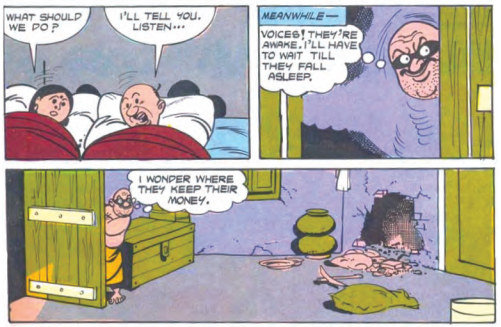
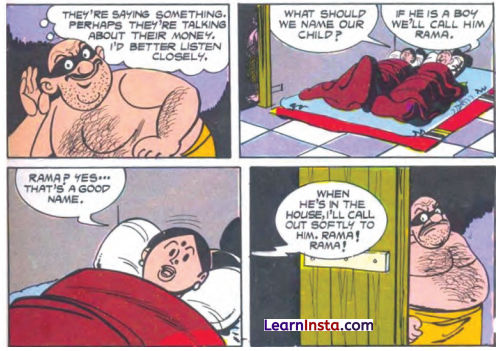
Question 2.
Who entered the house?: guest, robber, Kotwal.
Answer:
guest
Let us discuss (Page 23.)
Write whether True or False.
Question 1.
The man tells his plan to his wife.
Answer:
True
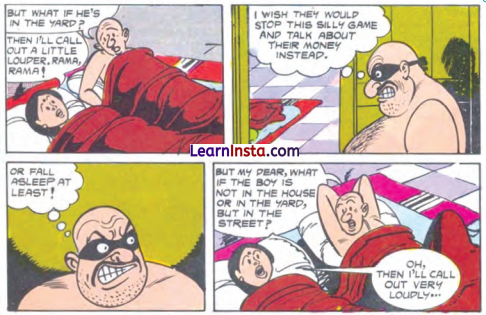
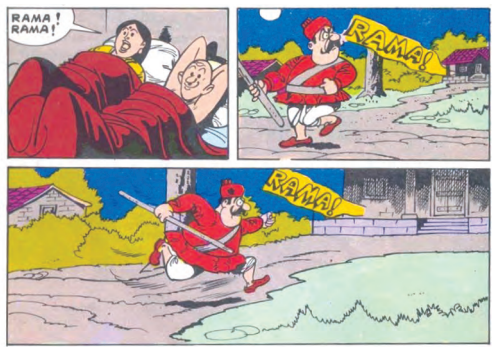
Question 2.
The thief wants to know where they kept their jewels.
Answer:
True
![]()
Let us discuss (Page 24)
Question 1.
Along with your classmates, call out the name ‘Rama’- softly, loudly and very loudly.
Answer:
Do it yourself.
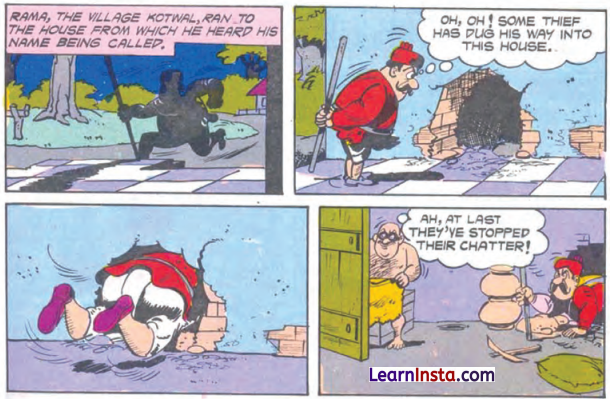
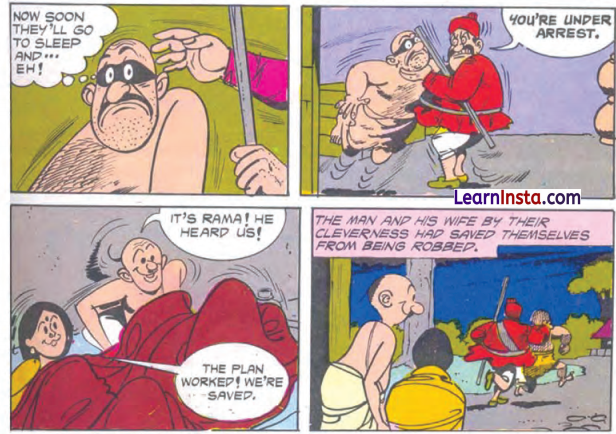
Question 2.
What do you think will happen next in the story?
Answer:
Rama will send the thief in the prison and the ’ man with his wife are awarded by the people of village for their bravely and cleverness which helped Rama, the village Kotwal to catch the thief.
Let us discuss (Pages 25-26)
Question 1.
Work in pairs to match the words in Column A with the meanings in Column B. Check your answers by sharing them with your teacher and classmates.
| Column A | Column B | ||
| 1. | wonder | (a) | in place of someone or something |
| 2. | yard | (b) | carefully |
| 3. | chatter | (c) | an area outside a building |
| 4. | instead | (d) | talk for a long time about unimportant things |
| 5. | closely | (e) | maybe |
| 6. | perhaps | (f) | a feeling of surprise |
Answer:
1. (f)
2. (c)
3. (d)
4. (a)
5. (b)
6. (c)
Question 2.
Fill in the boxes with suitable words as you read the story.
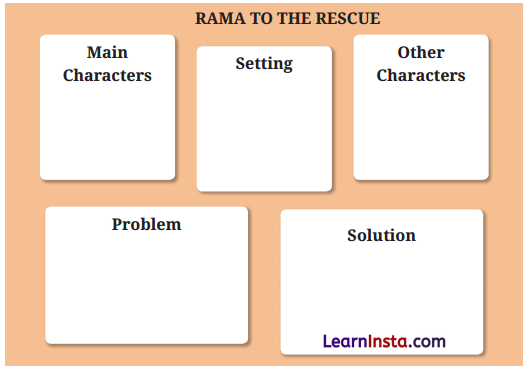
Answer:
Main Characters → Husband and Wife
Setting → A house in a village
Other Characters → Thief and Rama, the Kotwal
Problem → A thief had entered their house
Solution → The husband and wife pretended to be calling out the name of their child who was not born yet, But in reality it was the name of the Kotwal, who comes to their rescue and arrests the thief.
Let us think and reflect (Pages 26-27)
Question 1.
Read the following lines and then answer the questions that follow.
(a) Man: What’s the matter? What are you looking at?
Wife: Ssssh! Listen!
Man: Somebody is trying to get in.
Wife: I… I think he has got in … the noise has stopped.
(i) What makes the man say the first line?
(ii) Choose the correct option.
The wife says ‘Ssssh! Listen!’. What does the word ‘Ssssh’ mean here?
(a) sleep
(b) help
(c) rest
(d) be silent
(iii) How can you tell that the wife was listening carefully?
Answer:
(i) The man says the first line because he sees his wife looking in a specific direction. He wants to know what she is looking at because of her worried expression.
(ii) (d) be silent
(iii) The wife was listening carefully, therefore she told her husband to be silent and when he said somebody was trying to get in.
(b) Rama, the village Kotwal, rain to the house from which he heard his name being called.
Rama: Oh, Oh! Some thief has dug his way into this house.
(i) Fill in the blank with the correct word from the given lines.
The villagers caught the thief and took him to the ………
(ii) Choose the correct option.
What do the words “Oh, Oh!” show here?
(a) surprise
(b) anger
(c) pain
(d) happiness
(iii) How can you tell that the Kotwal was good at his job?
Answer:
(i) Kotwali – Police station
(ii) (a) surprise
(iii) The Kotwal was good at his job because he ran towards the house from which he heard his name being called. He reached there without any loss of time.
![]()
Question 2.
Give one reason why the man and his wife were not able to fall asleep.
Answer:
The man and his wife were not able to sleep because some thief had dug into their house and was waiting to rob them.
Question 3.
What did the thief wish would happen? Did it happen?
Answer:
The thief wished that the husband and wife should stop talking and fall asleep. This did not happen instead Rama the Kotwal entered into the house and arrested him.
Question 4.
How did the man and his wife get help from the Kotwal?
Answer:
The man and his wife used their intelligence and got help from the Kotwal. They pretended to be thinking about naming their child. They decided to call him Rama, which was actually the name of the village Kotwal. They said they would call the child softly if he was in the house, a bit loud if in the yard and louder if in the street. So, they called out Rama! Rama! loudly. The Kotwal heard his name being called out and rushed to their rescue.
Question 5.
Do you think cleverness can help us solve our problems? Why do you say so?
Answer:
In the story, the man and his wife saved themselves being robbed because of their cleverness. If they had been frightened in the situation, the thief might have robbed and hurt them. Cleverness, indeed, plays a significant role in problem-solving. So, it is wise to say that we should act cleverly in adverse situations to overcome them.
Let us learn (Pages 27-32)
Question 1.
Study the highlighted words in the following lines.
- I’m feeling so sleepy…
- It’s a thief.
- They’re awake.
The highlighted words given in the above sentences have one letter missing in each. What are they? Share them with your teacher and classmates.
Now, write the full words with the missing letter.
(a) ………… feeling so sleepy…….
(b) ……….. a thief.
(c) ………. awake.
The missing letters are marked by an apostrophe (’).
Answer:
(a) I am feeling so sleepy.
(b) It is a thief.
(c) They are awake.
Question 2.
Expand the following words. Two examples have been done for you. Use the contracted form of these words in sentences of your own.
| Contracted Words | Expanded Form | Sentences |
| (a) what’s | what is | |
| (b) I’ll | ||
| (c) I’d | ||
| (d) well | ||
| (e) that’s | ||
| (f) we’re | ||
| (g) don’t | ||
| (h) you’ll | ||
| (i) must’ve | must have |
Answer:
| Contracted Words | Expanded Form | Sentences |
| (a) what’s | what is | What’s the issue between both of you? |
| (b) I’ll | I will | I’ll reach the office on time. |
| (c) I’d | I had | I’d completed my homework. |
| (d) well | We will | Well go to Goa in our summer vacation. |
| (e) that’s | that is | That’s my bike. |
| (f) we’re | we are | We’re in trouble, please help us. |
| (g) don’t | do not | Don’t play outside in the sun. |
| (h) youll | you will | You’ll miss the train if you don’t rush now. |
| (i) must’ve | must have | They must have visited you when you were ill. |
Question 3.
Study the highlighted words and the words in the brackets in the following sentences from the story.
(a) I am feeling so sleepy. [am + feel + ing]
(b) What are you looking at? [are + look + ing]
(c) Somebody is trying to get in. [is + try + ing]
(d) They are saving something. [are + say + ing]
(e) Perhaps, they are talking about their money, [are + talk + ing]
Now, choose the correct option.
The sentences (a)-(e) refer to actions that ……….
[are going on at the time of speaking/happened in the past/will take place in the future]
Verbs that describe what -someone or something is doing at the moment of speaking
are in the present progressive tense.
Answer:
The sentences (a)-(e) refer to actions that are going on at the time of speaking.
Question 4.
Fill in the blanks to complete the following sentences.
(a) I ……….. in Grade 6. [am + study + ing]
(b) My friend …….. a story book. [is + read + ing]
(c) We ….. a board game. [are + play + ing]
(d) I …….. a new language. [am + learn + ing]
(e) The teachers ……. in the staff room. [are + sit + ing]
(f) My mother …….. food in the kitchen. [is + cook + ing]
Answer:
(a) I am studying in Grade 6.
(b) My friend is reading a story book.
(c) We are playing a board game.
(d) I am learning a new language.
(e) The teachers are sitting in the staff room.
(f) My mother is cooking food in the kitchen.
Question 5.
Study the following picture and fill in the blanks with the present progressive form of verbs.
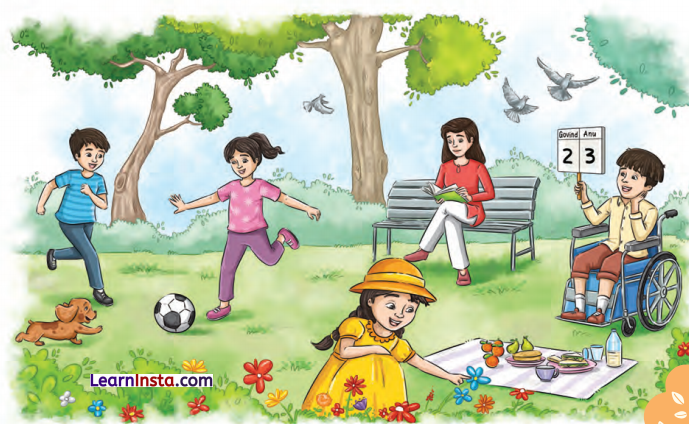
(a) Govind and Anu ………. football.
(b) Pema ……….. flowers.
(c) Anil ………. the score card.
(d) The mother …….. a book.
(e) The dog …….. to catch the ball.
(f) The birds ………. in the sky.
Answer:
(a) Govind and Anu are playing football.
(b) Pema is plucking flowers.
(c) Anil is showing the score card.
(d) The mother is reading a book.
(e) The dog is trying to catch the ball.
(f) The birds are flying in the sky.
Question 6.
Study the following sentences from the story and complete the table. One example has been done for you.
(a) I’d better listen closely.
(b) When he’s in the house, I’ll call out softly to him.
(c) Then I’ll call out very loudly……
| Sentence | Question | Word |
| 1. I’d better listen closely. | How does he listen? | a. closely |
| 2. When he’s in the house, call out softly to him. | How does she call out? | b. |
| 3. Then I’ll call out very loudly. | How does she call out? | c. |
Words that give more information about the verb, such as how, when, where, etc. are called adverbs.
Answer:
| Sentence | Question | Word |
| 1. I’d better listen closely. | How does he listen? | (a) closely |
| 2. When he’s in the house, call out softly to him. | How does she call out? | (b) softly |
| 3. Then I’ll call out very loudly. | How does she call out? | (c) loudly |
Question 7.
Fill in the blanks with suitable adverbs from the box given below. There are two extra words that you do not need.

(a) He solved the mathematics problem _____
(b) The car moved _____ along the highway.
(c) The musician played the guitar _____.
(d) Shobha danced ______.
(e) Rohit left the house
Answer:
(a) He solved the mathematics problem quickly.
(b) The car moved smoothly along the highway.
(c) The musician played the guitar beautifully.
(d) Shobha danced gracefully.
(e) Rohit left the house hurriedly.
Question 8.
Fill in the blanks with suitable adverbs from the box given below. There are two extra words that you do not need.

Once upon a time in a small forest, animals lived (i) _____. The wise old tortoise moved (ii) ____ but always won the race against the proud rabbit. The ants worked (iii) _____, gathering food for the winter. The kind-hearted lion ruled the jungle (iv) ____, giving everyone a chance to speak. The birds sang (v) ___, making everyone in the forest happy.
Answer:
Once upon a time in a small forest, animals lived (i) peacefully. The wise old tortoise moved (ii) slowly but always won the race against the proud rabbit. The ants worked (iii) tirelessly, gathering food for the winter. The kind-hearted lion ruled the jungle (iv) honestly, giving everyone a chance to speak. The birds sang (v) sweetly, making everyone in the forest happy.
Question 9.
Study the following sentences from the story and choose the correct option.
(i) Oh, hum! What a hard day it has been!
(ii) Ah, at last, they’ve stopped their chatter!
(iii) What should we do?
(iv) What should we name our child?
(a) Sentence (i) expresses a feeling of ………. (tiredness/joy)
(b) Sentence (ii) expresses a feeling of ……. (wonder/relief)
(c) Sentences (iii) and (iv) ask ………… (answers /questions)
Answer:
(a) tiredness
(b) relief
(c) questions
Question 10.
Punctuate the following sentences and write whether they are exclamatory or interrogative sentences.
(a) Wow, what an intelligent man he is
(b) Oh how big the hole is
(c) Do you like to read comic books
(d) What is your favourite story
Sentences that express a strong feeling are called exclamatory sentences. They are marked by an exclamation mark (!).
Sentences that ask questions are called interrogative sentences. They are marked by a question mark (?).
Answer:
(a) Wow, what an intelligent man he is! – Exclamatory sentence
(b) Oh, how big the hole is! – Exclamatory sentence
(c) Do you like to ’read comic books? – Interrogative sentence
(d) What is your favourite story? – Interrogative sentence
![]()
Let us listen (Page 32)
You will listen to a security guard making an announcement to the people in the neighbourhood. As you listen, fill in the blanks with only one word that you hear. (refer to NCERT page 38 for transcript)
The security guard announced that (i) ……. has been happening in that area. He advised everyone to stay safe and the kids to tell the (ii) …… as soon that (iii) …….. is the main thing. He asked them to call (iv) ……. when they need immediate help.
Answer:
(i) robbery
(ii) adults
(iii) safety
(iv) 100
Let us speak (Pages 32-33)
Question 1.
Listen to your teacher pronounce the contractions and repeat after your teacher.

We use contracted form of the verbs while speaking and expanded form of the verbs while writing.
Now, speak these contractions clearly along with your teacher and classmates.
![]()
Answer:
Do it yourself.
Question 2.
Discuss in pairs:
(a) Why do you think it’s important for people to keep their house and themselves safe? Tick the suitable reasons.
(i) To be safe from injury ()
(ii) To keep family members and pets safe ()
(iii) To stop accidents from happening ()
(iv) To make sure they visit the doctor regularly ()
(v) To stop robbery ()
(vi) To pay the electricity bill ()
(vii) To save money ()
Answer:
(i) (✓)
(ii) (✓)
(iii) (✓)
(iv) (✗)
(v) (✓)
(vi) (✗)
(vii) (✓)
(b) Now, use the given hints to share your reasons in complete sentences with your teacher and classmates.
- I think it’s important because … /
I feel it’s necessary as … / - The reason we need to look at safety is …
Answer:
- I think it’s important because safety helps prevent accidents, injuries, and loss of life.
- I feel it’s necessary as it protects us against theft, and other criminal activities. It creates a sense of security.
- The reason we need to look at safety is that it helps to safeguard our possessions and loved ones, and provides a safe and secure environment.
(c) Use the given hints to share three ideas on how people can keep their houses and themselves safe. Share with your classmates and teachers.
- I think they should … /
- I suppose they could … /
- They must… /
- They should … /
- How about … /
- It might be better to …
Answer:
I think they should install good security systems, including alarms and cameras. The systems can scare the intruders and alert the owners in case of any suspicious activity.
I suppose they could increase the physical security of their homes by installing strong doors and windows with superior-quality locks. Additionally, using video doorbells can add an extra layer of security.
They must create and regularly practice mock drills, to stay safe during natural disasters. This ensures everyone in the household knows what to do in case of an emergency.
(Answer may vary)
Let us write (Page 34)
The next day, the neighbour asked the man in the story about what had happened. As the man, tell the neighbour what had happened in your own words. Remember to include the following:
when ………………….
where ………………..
what ………………..
how ………………
why …………….
You may begin this way:
My wife and I were about to go to sleep last night when
we heard someone …….
Answer:
My wife and I were about to go to sleep last night when we heard someone trying to enter our house. I saw my wife looking in a certain direction and asked me to be quiet. The thief had entered our house but I wondered how. We started talking and I was sure the thief must be wondering why didn’t we fall asleep and let him steal the things. We discussed the name of our child and decided if we had a boy we would call him Rama. We decided on Rama because it is the name of the village Kotwal.
I was sure the thief must be wondering why we were calling out Rama in the middle of the night. How she would call out for the child if he was in the house, I asked my wife. She called out Rama softly. Then I asked if he was in the yard and then in the street. In this way, we fooled the thief and called fama, Rama! at the top of our voice. Rama, the Kotwal came running and arrested the thief and saved us.
![]()
Let us explore (Page 34)
Question 1.
Find out from your teacher or parents what you would do in the following situations.
Who will you call if …
- you see fire
- you see someone getting hurt
- you see a wounded animal
- you see someone suspicious
- you find a lost child
- you get lost
Answer:
- fire brigade
- emergency medical services
- PETA
- the police
- child helpline
- any relative or child helpline
Question 2.
Find the right path for the Kotwal to catch the thief
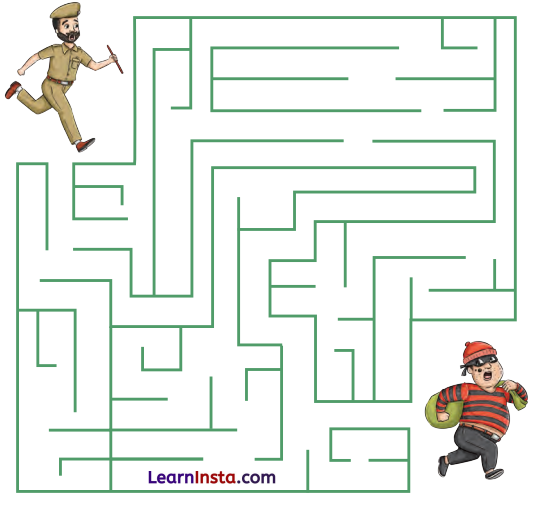
Answer:
Do it yourself.